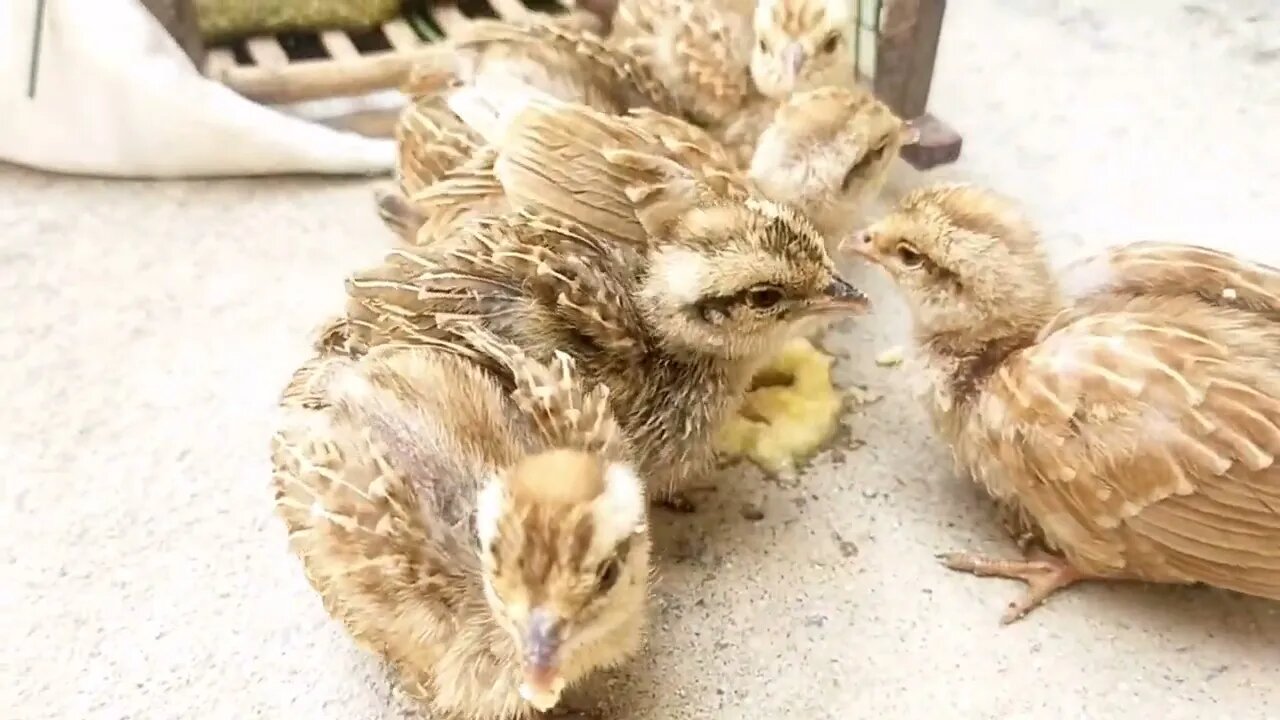Premium Only Content

Teetar Chicks Feeding | Dakhni Teetar Chicks | Irani Teetar Chicks | Partridge
Feeding teetar chicks, whether they are Dakhni Teetar (Indian Gray Francolin) chicks, Irani Teetar (Iranian Chukar Partridge) chicks, or any other type of partridge, requires careful attention to their nutritional needs. Here are some general guidelines for feeding teetar chicks:
Starter Feed: When teetar chicks are hatched, they should be provided with a high-quality starter feed specifically designed for game birds or gamefowl. This feed is formulated to meet the nutritional requirements of young birds.
Protein Content: Teetar chicks need a high-protein diet to support their rapid growth and development. Look for a starter feed with around 24-28% protein content.
Crumbled or Mash Feed: Teetar chicks often do better with crumbled or mashed feed as it is easier for them to eat compared to large pellets. This is especially important during the first few weeks of life.
Feeding Schedule: Teetar chicks should be fed multiple times a day, typically every 2-3 hours during the first week. Gradually reduce the frequency as they get older, but always make sure they have access to fresh food and water.
Water: Clean, fresh water should always be available to teetar chicks. Ensure that their water containers are shallow and easy for them to access without the risk of drowning.
Grit: Grit (small, hard stones) may be provided to teetar chicks to help them digest their food. Grit assists in the breakdown of grains in their gizzard.
Supplements: Depending on the specific needs of your teetar chicks and the quality of your feed, you may need to provide vitamin and mineral supplements. Consult with a poultry nutritionist or veterinarian for guidance on supplementing their diet.
Greens and Insects: As teetar chicks get older, you can introduce small amounts of fresh greens and insects into their diet. These natural foods can provide essential nutrients and encourage foraging behavior.
Monitor Growth: Keep a close eye on the growth and development of your teetar chicks. Adjust their diet as needed to ensure they are growing at a healthy rate.
Cleanliness: Ensure that their feeding and drinking containers are kept clean to prevent the spread of disease.
Remember that the specific dietary needs of teetar chicks can vary depending on their age and health. It's essential to monitor their behavior and condition and consult with a poultry expert or veterinarian for personalized advice if you encounter any issues. Additionally, local availability of feeds and supplements may influence your choices, so it's essential to adapt these guidelines to your specific circumstances.
https://youtu.be/nAkkEesL7xs
#teear #chicks #dakhniteetar #iraniteetar #sindhiteetar #partridge
-
 2:11:18
2:11:18
The Quartering
3 hours agoToday's Breaking News! Disgusting Grocery Shopping "Haul" Goes Viral, Las Vegas Collapse & More
68.8K18 -
 LIVE
LIVE
StoneMountain64
4 hours agoBest Extraction shooter is FINALLY on Console (+CoD Reveal Today)
281 watching -

Due Dissidence
6 hours agoZelensky RETURNS To DC, HUGE Protests In Israel, Gal Gadot Blames Palestine For Flop, MSNBC Rebrands
14K13 -
 LIVE
LIVE
The HotSeat
1 hour ago🚨 Dems Swear Mail-In Voting Is “Secure”… Trump Says HELL NO 🚨
547 watching -
 LIVE
LIVE
Reidboyy
8 hours ago $0.55 earnedNEW FREE FPS OUT ON CONSOLE TODAY! (Delta Force = BF6 Jr.)
56 watching -
 29:20
29:20
Stephen Gardner
1 hour ago🔥YES! Trump unleashes Democrats’ worst nightmare!
6.42K7 -
![[Ep 731] Trump Leading the World | Islam NOT Compatible with West | Guest Sam Anthony [your[NEWS](https://1a-1791.com/video/fww1/93/s8/1/c/n/K/a/cnKaz.0kob-small-Ep-731-Trump-Leading-the-Wo.jpg) LIVE
LIVE
The Nunn Report - w/ Dan Nunn
2 hours ago[Ep 731] Trump Leading the World | Islam NOT Compatible with West | Guest Sam Anthony [your[NEWS
157 watching -
 2:05:30
2:05:30
Side Scrollers Podcast
6 hours agoEveryone Hates MrBeast + FBI Spends $140k on Pokemon + All Todays News | Side Scrollers Live
74.4K2 -
 46:56
46:56
The White House
5 hours agoPress Secretary Karoline Leavitt Briefs Members of the Media, Aug. 19, 2025
43.5K67 -
 1:11:36
1:11:36
Sean Unpaved
4 hours agoFootball Flashpoint: Bengals' D in Distress, Colts' Bet on Jones, & Micah's Trade Talks
34.5K2